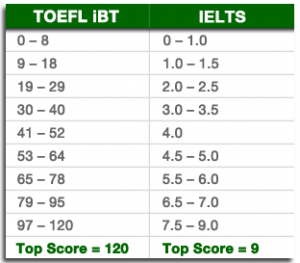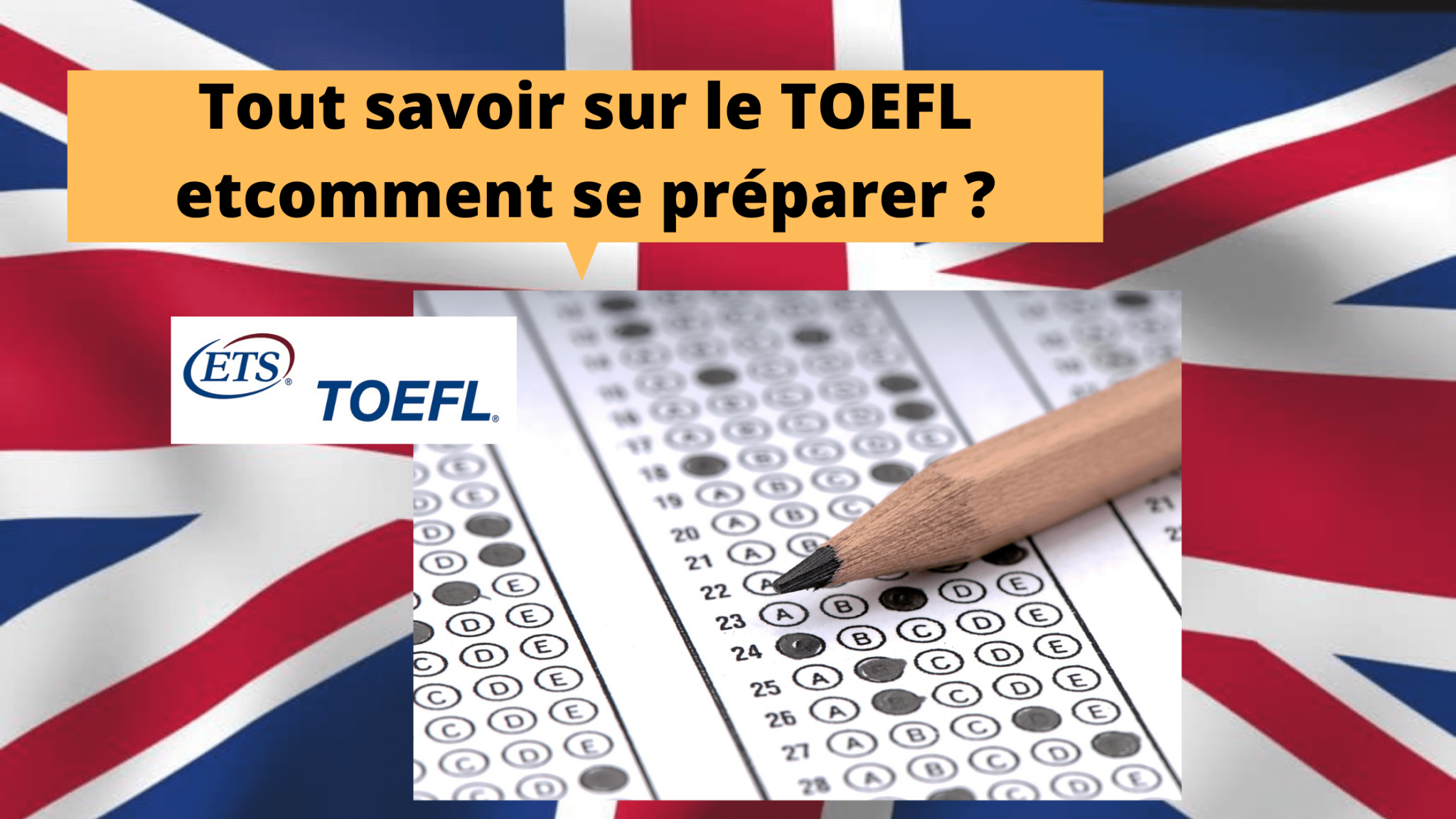In a previous article, we discussed that for the IELTS, it’s advisable to take English courses online or at home, which will provide access to training courses or schools where the courses are in English, just like the TOEFL. But what’s the difference between the two? Are English courses also recommended for TOEFL preparation?
While IELTS is a British English exam, TOEFL is an American English exam, which means that the listening tests will be taken by people with an American accent. Another difference is that TOEFL doesn’t have two versions like IELTS (academic and general); it is purely academic. In fact, the test attempts to place the candidate in real-life situations that are experienced on a daily basis in American universities (master classes, conversations between professors and students, scientific articles, etc.).
The purpose of TOEFL is therefore very specific, since it is indicated for students who are going to undertake undergraduate or graduate studies in an English-speaking university, as well as for applicants for scholarships or internships abroad. It is important to note that both IELTS and TOEFL are generally accepted by American and English universities. The decision to take either of these exams will therefore be determined by the individual’s understanding of each accent (American and English) and the slight grammatical differences between the two.
To pass the TOEFL, it is highly recommended to take English courses to prepare for these exams, as it is not only necessary to have a good level of language but also to understand the structure of the exam, so as to be able to complete its different sections in less time and in a more assertive manner. With Polytongue Academy, you can prepare for your exam with our teachers online or at home if you live in Paris or Lyon.
Exam formats
The TOEFL is offered in 3 possible formats:
– PBT (Paper Based Test) which, as the name suggests, is in paper format. This format has no oral component, and is only used in centers where the iBT has not yet been implemented.
– The CBT (Computer Based Test) is entirely computer-based. In 2005, it was gradually replaced by the iBT. Unlike PBT, this format included an oral component.
– The iBT (Internet Based Test) is currently the most frequently used format. The structure is the same as that of the old CBT, except that during the test, data is sent via the Internet instantaneously to head office, from which it is distributed to graders. In effect, the test is taken “online”.
Exam structure
The TOEFL iBT is divided into four parts: “Listening”, “Reading”, “Speaking” and “Writing”, and lasts around 3.5 hours, with a break of just 10 minutes between the first two parts and the last two. The PBT lasts around 4 and a half hours because, even though it does not include a speaking section, the Listening and Reading sections are much longer than in the iBT.
A special feature of this test is that each of the above sections is not isolated. In the new TOEFL model, the use of several language skills is assessed simultaneously. For example, in Speaking, you may be asked to read a paragraph from a newspaper article, then listen to someone’s opinion on the subject, and then be asked to comment on or criticize the opinion you’ve heard, so you’re mixing the skills of reading, listening and speaking at the same time.
This characteristic of combining language skills makes TOEFL a very special test, with its emphasis on practical language use rather than grammatical detail.
Remember, with the help of our teachers, you can achieve your goal! Prepare for your TOEFL with our English courses online or at home if you live in Paris or Lyon.
– Reading (Duration: 60-100 minutes)
The reading comprehension part involves reading between 3 and 5 texts and answering between 36 and 70 questions about them (depending on the iBT or PBT respectively). Questions are generally multiple-choice.
– Listening (Duration: 60-90 minutes)
The listening comprehension section includes 34 to 51 questions on various recordings of university lectures, discussions on academic topics and conversations, all set in the American university environment.
– Speaking (Time: 20 minutes, iBT only)
The speaking part consists of 6 exercises grouped into 3 blocks. In the first block, we are asked to speak on a topic from everyday life for 45 seconds. The challenge is to organize a speech of this length in a very short preparation time (15 seconds between the moment we know the subject and the start of our speech).
In the second block, we are given a text to read in 45 seconds. Then, the text disappears and we listen to a conversation on the topic discussed in the text. Finally, we’re asked to explain the topic in a short speech, using information from the text and the conversation. We have to speak for 1 minute and organize the ideas given to us in 30 seconds.
Finally, in the third block, we listen to a segment from a university class or a conversation between two people. Then we’re asked a specific question on a topic we’ve heard, which we must answer within a one-minute time limit, having 20 seconds to organize ideas and prepare the speech.
– Writing (Duration: 50 minutes)
The final part of the exam assesses written expression in two exercises. In the first, we are given a text to read within a limited time frame (around 3 minutes). Then, the text disappears and we listen to a conversation on the topic discussed in the text. We then have 20 minutes to write an essay of between 150 and 225 words, bringing together the information from the reading and the conversation in a clear and orderly fashion. In the second exercise, we have 30 minutes to write an opinion essay of at least 300 words on a specific topic.
Remember, we recommend that you take English courses to prepare for the TOEFL. At Polytongue Academy, we offer specialized English courses for exam preparation, where you can work on each of these sections to pass the exam and achieve an excellent result. You’ll work on standard questions and take mock exams.
Recommendations
– It is essential to take notes on all exercises in all 4 sections.
– Notes should not only reflect general ideas but also details, as many questions throughout the exam collect small details that may go unnoticed. In addition, notes need to be taken quickly, as deadlines are fairly tight.
– On the other hand, it’s very important to make sketches that organize the ideas we’re going to develop in the oral presentations in the “speaking” section. These sketches also need to be made very quickly, as preparation times are between 15 and 30 seconds maximum.
Punctuation, equivalence and expiration
The test score depends on the format in which it is administered:
– On the PBT, the score ranges from 310 to 677 points
– In the old CBT, between 0 and 250 points.
– And in the current iBT, between 0 and 120 points. In the latter case, all sections receive the same score, i.e. between 0 and 30 points each.
It’s important to remember that, as with IELTS, TOEFL is neither a pass nor a fail, but we are given a score, so if it’s below the minimum requirement of the institution we want to enter, we’ll have to retake the test, whereas if it’s above, we’ll have “passed”. The following tables show the approximate equivalences between TOEFL and IELTS, and TOEFL and the Common European Framework of Reference for Languages (CEFR):

Once the test has been successfully completed, the certificate is sent to the candidate’s home address, as well as to a maximum of 4 universities that we have chosen during the TOEFL registration process. It is very important to know which universities we are going to address before the test, because if we don’t indicate the target institutions in the registration, we lose the right to these 4 free mailings and will then have to pay $18 for each of them. It is important to note that the TOEFL certificate is valid for 2 years. After this period, if we wish to reapply to another university and are invited to take the TOEFL as a prerequisite, we must retake the test.
Where to take the test and prices
The TOEFL test is offered on approximately 50 dates per year. This, combined with over 4,500 test centers in more than 165 countries, makes scheduling and taking the test convenient. Through this link, you can consult the centers where you can take the test.
The cost of the test varies considerably from country to country (between $195 and $275). France is one of the most expensive countries in which to take the exam. In 2017, you will have to pay 245 dollars to register (around 210 euros).
It is important to note that although this is an exam where the accent and grammatical peculiarities of American English will be used, it’s not necessary to travel to the USA to prepare for it. At Polytongue Academy, we offer exam preparation courses with native or bilingual teachers who are TOEFL experts. Try your first course for free!





